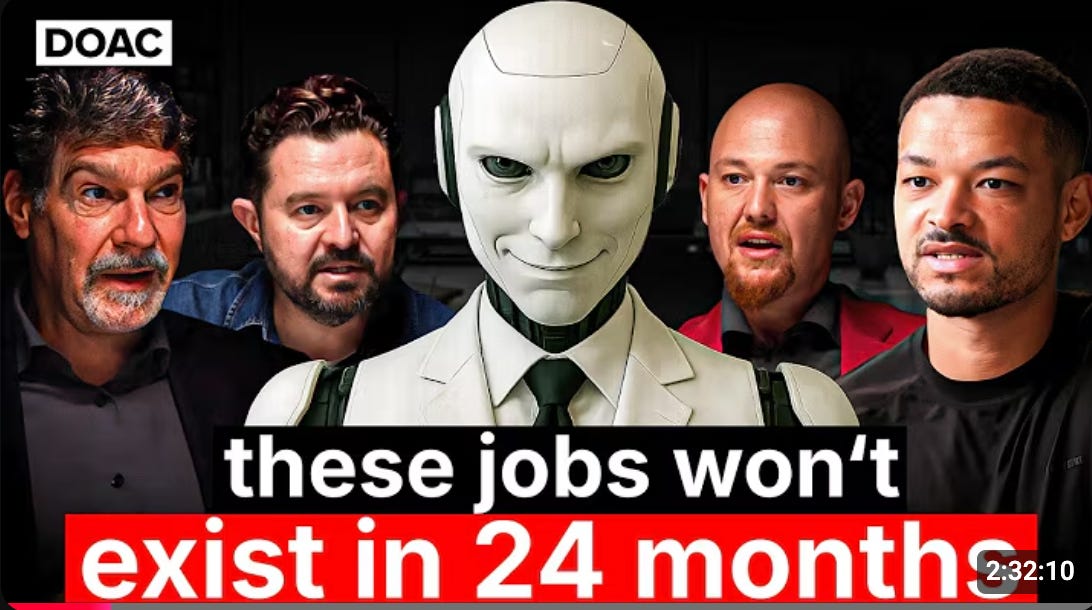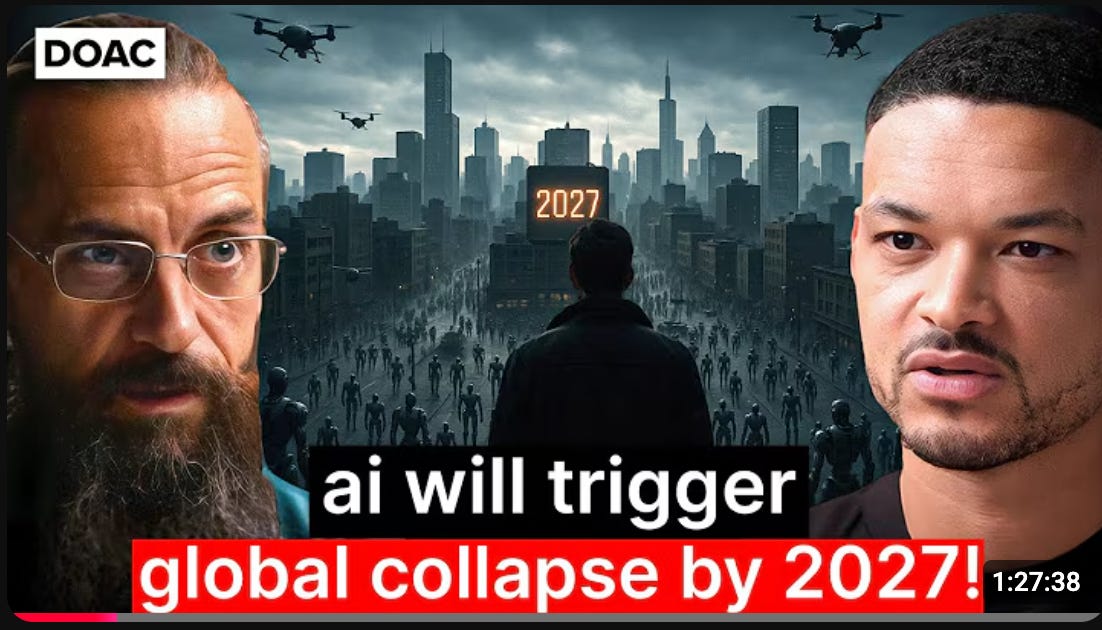What 50,000 workers really think about their AI future
I spent a week digging into YouTube comments - here's what I found.
This week, instead of reading another report, I went to the comments.
50,000 of them, spread across three massive Diary of a CEO episodes about AI and work.
Not because I enjoy internet debates, but because this might be the best real-time mirror we have for how we collectively feel about the future of work.
One of the biggest podcasts in the world, with a hugely engaged audience representing a cross-section of society. Not just anonymous trolls or tech enthusiasts, but teachers, accountants, managers, lawyers.
Your colleagues. Your friends. Your family members.
All processing the same uncertainty you're navigating. All asking the same questions your teams are asking.
What I discovered isn't clear cut – how could it be with 50,000 comments from tens of thousands of people? But it does highlight interesting trends for how we should think about AI's impact on our work, both as individuals or leaders.
And it's proven an incredible insight into how people process change when everything feels like it's shifting.
1. The dominant feeling is complexity
The first thing that strikes you isn't panic or optimism. It's complexity.
"The biggest problem is human greed."
"Smart people racing toward our apocalypse."
"If AI changes everything, I'll still know how to sell."
"Not everyone can be an entrepreneur. That's survivorship bias."
People aren't neatly divided into believers and sceptics.
They're wrestling with multiple contradictory feelings simultaneously. Excited about possibility. Worried about fairness. Sceptical of hype. Practical about adaptation.
People are holding complexity because the situation is genuinely complex.
I see this in every client conversation about change too. People don't want - or need - simple answers to complicated questions.
2. Agency is the real dividing line
The clearest pattern wasn't about optimism versus pessimism. It was about control.
Comments focused on what might happen to people carried helplessness:
"What's the point of planning if everything changes overnight?"
"Feels like we're all waiting to be replaced."
On the other hand, plenty of people are approaching the challenge with a sense of agency.
"I've been using ChatGPT for months. Here's what works..."
"This gave me the push to start building instead of worrying."
In short, one clear dividing line is whether you feel like you can influence what's happening to your career? To your future?
This is critical for all of us, but particularly those leading team – anxiety fades when people feel they have options.
3. The same personalities keep showing up
After reading thousands of comments, I kept spotting the same characters.
And it’s not hard to see how they map to the people you sit alongside in meetings every day:
The Alarmist sees danger everywhere. Raises risks others ignore.
"Smart people are racing toward something that might be our apocalypse."
The Stalwart is deeply invested in their craft. Resistant to throwing it all away.
"I spent 15 years building this career. Now I'm supposed to start over?"
The Sceptic cuts through hype, demands evidence.
"Easy to succeed when you already have capital and connections."
The Builder doesn't argue, just experiments.
"Built a workflow yesterday that saves our team hours."
The Seeker hungers for direction. Constantly asks what to do next.
"Should I learn to code or learn to manage AI?"
None of these responses are wrong. Each reflects a valid way of processing major change.
For leaders, the insight is simple: stop trying to convert people. Start working with them.
4. Scepticism dominates, but it's constructive
Amongst the fear and excitement, the voice of The Sceptic can be heard loud and clear.
"We can't get basic software to work reliably. Why trust this?"
"Another day, another 'everything will change' prediction."
These are people who've lived through multiple hype cycles. They've seen promises that didn't deliver.
But scepticism can be healthy if it leads to action.
In one episode's comments, nearly one in four responses were practical suggestions, not panic. People applying past experience to current challenges.
So take them as a challenge.
Sceptics often become the strongest advocates once convinced - they've already stress-tested the idea.
5. People want direction, not predictions
The most engaged comments weren't debates about AI capabilities. They were practical questions:
"What careers are actually safe?"
"Should I be learning to code or learning to manage AI?"
"How do I explain to my team that their jobs aren't disappearing, just changing?"
People aren't looking for more information about AI. They have plenty of that.
They're looking for frameworks to make decisions under uncertainty
.
What this means for leaders
Here's what I'd focus on if I were running your team:
Stop selling certainty you don't have. People can handle uncertainty if you're honest about it.
Create experiments, not strategies. Give people small ways to build experience rather than big transformation plans.
Work with sceptics, not around them. They're doing your risk assessment for free. Put them in charge of testing assumptions.
Address agency, not anxiety. Fear comes from helplessness. Give people things they can control.
Focus on next steps, not final destinations. People need direction, not predictions about 2030.
If it feels like your team is resisting change, that’s probably not it. They're just processing it the same way humans always have – by asking what it means for them and what they can do about it.
The answers to those questions determine everything else.
And they're already being argued over in the comments.
Thanks for reading.
Ollie





